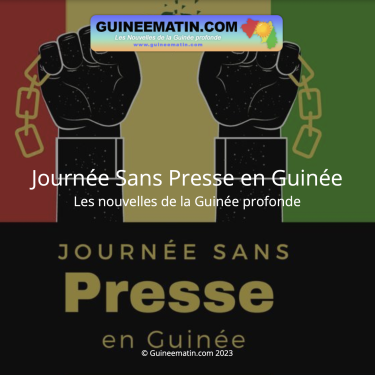Unprecedented press freedom violations by Guinea’s military junta

Reporters Without Borders (RSF) calls on Guinea’s military junta to stop obstructing journalists, after a wave of press freedom violations in the past 10 days – including Internet cuts, social media censorship and radio station jamming – that is without precedent since the military seized power in September 2021.
For the first time in Guinea’s history, organisations representing public and private sector TV, radio, print and online media staged a “Day without Media” protest on 23 May to denounce the social media cuts, restrictions on access to online media, equipment seizures and intimidation to which the authorities have subjected them in response to political unrest.
This obstruction is unprecedented. The military seemed receptive to the recommendations that RSF made in October 2021 but now, nearly two years after they took power, the situation is worsening dramatically and the number of violations against journalists and media is growing alarmingly. The junta must rein in its increasingly authoritarian tendencies and, as a matter of urgency, must take steps to safeguard press freedom instead of restricting it.
Amid opposition protests and calls for protests against the junta, social media such as Facebook, Instagram, WhatsApp and TikTok have been cut and Internet access has been restricted for the past week or so. The signals of radio stations such as privately-owned Fim FM and Djoma FM have been jammed, and news sites such as Africa Guinée and Guinée Matin have been inaccessible.
“We have been forced to buy and install VPNs in order to continue publishing,” Guinée Matin founder Nouhou Baldé told RSF. However, even if websites have managed to acquire VPNs, this is not necessarily the case with their readers. “Unfortunately, not all Guineans can afford to buy them as well and our readership figures are in free fall. We are demoralised.”
Junta-imposed restrictions
Amadou Tham Camara, the head of the Guinean Online Press Association (AGUIPEL), blames the cuts and jamming on the authorities. “If this were just a breakdown, we wouldn’t be able to access foreign sites either, but it’s only the most popular Guinean websites and social media that are inaccessible,” he said.
The cuts followed other forms of censorship. On 17 May, police officers who said they had been sent by the Posts and Telecommunications Regulatory Agency (ARPT) dismantled transmitters and seized equipment belonging to Afric Vision, an independent media group that includes the Sabari FM and Love FM radio stations. Afric Vision has yet to receive any explanation, despite its attempts to contact the ARPT management.
The day after the two radio stations’ transmitters were seized, government spokesman and telecommunications minister Ousmane Gaoual Diallo denied any government involvement in the Internet disruptions or the operation against Afric Vision, but he went on to threaten any media making “statements likely to undermine national unity” with closure. “If a media violates these provisions, we will shut it down in broad daylight,” he said.
In the same statement, Diallo also found time to point out that “fewer than 2% of the media” were up to date with their payments of dues to the state. “This was a way to tell media owners that they could be targeted by this route as well,” a media owner said, speaking on condition of anonymity.
Violence against journalists
Journalists have also been subjected to physical violence. Two website reporters – Guinée Info’s Aliou Maci Diallo and Guinée 114’s Mamadou Macka Diallo – were stopped by soldiers when out reporting on a motorcycle in the Conakry suburb of Bambéto on 17 May. The soldiers asked them what they were doing and told them was “no demonstration” that day. Then one of the soldiers insulted them, threatened to slash their motorcycle’s rear tyre and dealt the Guinée Info reporter several hard blows to the head.
They have not been the only victims of violence. Ibrahima Foulamory Bah, a reporter for the Courrier de Conakry, an independent online newspaper, was covering a protest on 9 May when he was violently arrested by members of the presidential guard posted outside the prime minister’s office, who photographed him and examined the contents of his phone before releasing him an hour later.
The staff of the Fim FM programme "Mirador" (Outlook) and the Djoma FM programme “On refait le monde” (Remaking the world) were summoned by the Guinean media regulator, the High Authority for Communication (HAC), on 17 and 18 May and were reprimanded about the “tone adopted in your programmes.” Both programmes had been commenting about the opposition protests.
Media response
The “Day without Media” protest is just one example of the media’s response to the junta’s obstruction. Guinea’s media associations have publicly accused the government of “censorship” while the organisations representing privately-owned TV, radio, newspapers and news sites have branded the government’s spokesman as an “enemy of the Guinean media.” They have also announced a “boycott of all government activities until all restrictions are lifted” and nationwide protest marches for 1 June.
Guinea is ranked 85th out of 180 countries in RSF's 2023 World Press Freedom Index.
